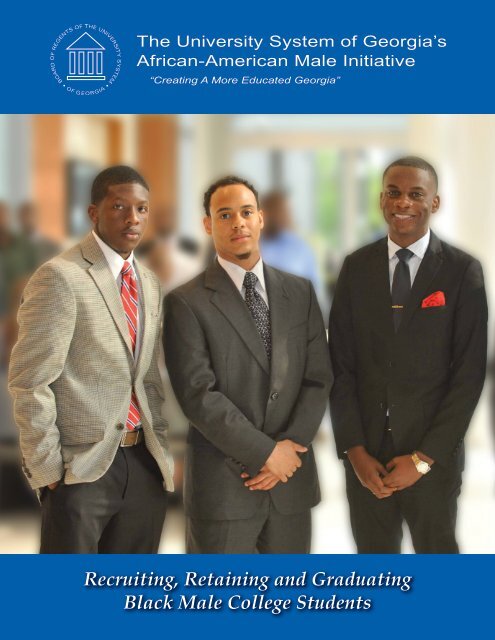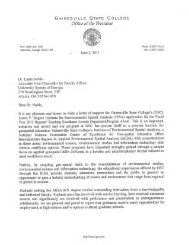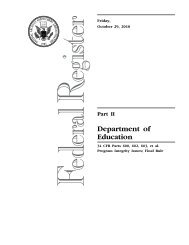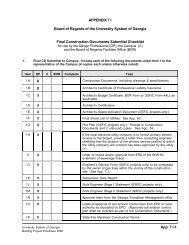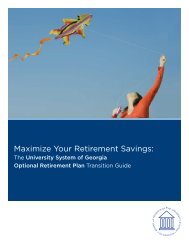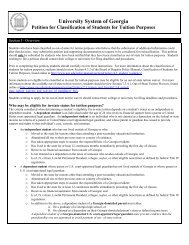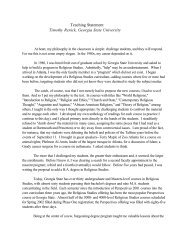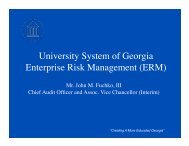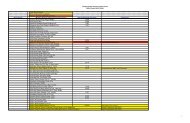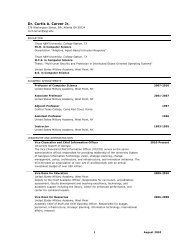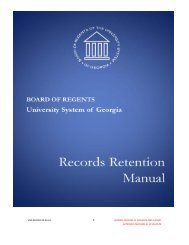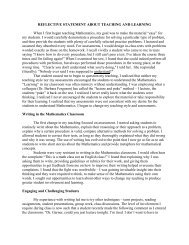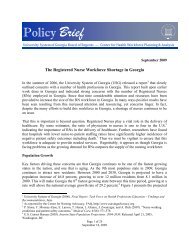Recruiting, Retaining and Graduating Black Male College Students
Recruiting, Retaining and Graduating Black Male College Students
Recruiting, Retaining and Graduating Black Male College Students
- No tags were found...
Create successful ePaper yourself
Turn your PDF publications into a flip-book with our unique Google optimized e-Paper software.
That funding also enabled AAMI to more strongly partnerwith the USG’s Office of Strategic Research <strong>and</strong> PolicyAnalysis, dedicating a research associate to work directlywith that office on the program’s data-collection efforts.In October 2006, the program moved its home from theBoard of Regents’ offices to the campus of KennesawState University, with strong support from KSU PresidentDr. Daniel S. Papp. Papp was highly involved in AAMI’sinitial implementation during his tenure as a senior vicechancellor at the Board of Regents, serving as ex officio ofthe AAMI task force. The program now is administered inthe office of KSU’s Vice President of External Affairs, therole Perry-Johnson now holds.In 2009, when the Lumina Foundation awarded its secondgrant to AAMI, the funding was for $500,000 over twoyears. That generous grant has enabled AAMI to significantlyexp<strong>and</strong> its programming <strong>and</strong> reporting capabilities, to launcha retention initiative in partnership with the Student African-American Brotherhood (SAAB), <strong>and</strong> to document impressiveoutcomes. That same year, AAMI further honed its effortsto focus specifically on undergraduate efforts that yieldedimpressive results.Collaborations <strong>and</strong> PartnershipsAAMI thrives on building partnerships, both with theUSG campuses <strong>and</strong> with external organizations. One ofthe program’s recent collaborations is the partnershipbetween AAMI <strong>and</strong> the national office of SAAB. SAAB isdevoted to increasing the number of African-American<strong>and</strong> Latino males that graduate from college by settingexamples of excellence in academics <strong>and</strong> leadership. Witha portion of its Lumina funding, AAMI launched SAABchapters at eight USG institutions to enhance participationby African-American <strong>and</strong> Latino males in campus life <strong>and</strong>leadership activities.AAMI officials worked with SAAB officials to identifyparticipating campuses through a data-analysis processthat benchmarked the retention <strong>and</strong> graduation rates of<strong>Black</strong> males at all USG institutions relative to the nationalbenchmark for the same types of institutions with similaradmissions profiles. The initiative has been successful withmany of the participating campuses <strong>and</strong> with the young menthat it serves to engage, with one of the USG’s AAMI-SAABchapters being honored for its success at the 2012 SAABnational convention.Sharing Best Practices <strong>and</strong> OutcomesIn December 2007, AAMI program officials convened theinaugural AAMI Best Practices Conference at KennesawState University to share the outcomes, challenges <strong>and</strong>successful strategies that enhance educational results forGeorgia’s African-American male students. The 2007conference marked AAMI’s five-year milestone, <strong>and</strong> featuredan awards banquet, nationally recognized speakers in thefield of <strong>Black</strong> male educational attainment, <strong>and</strong> 11 specializedworkshop sessions tailored to the needs of the staff <strong>and</strong>student conferees. Networking breaks provided additionalopportunities for conference attendees to meet <strong>and</strong> exchangeinformation with their USG colleagues. The success of thatinaugural conference prompted AAMI student participants<strong>and</strong> campus officials to rally for similar future gatherings.As a result, AAMI convened its second Best PracticesConference in April 2011, at Macon State <strong>College</strong> in Macon,Georgia, to mark the culmination of the $500,000 LuminaFoundation grant. Among many conference highlights, notedactor, author <strong>and</strong> philanthropist Hill Harper facilitated a90-minute “Open Forum for <strong>Black</strong> <strong>Male</strong>s,” during whichhe challenged the attendees to push themselves to theirhighest possible levels of performance. An interactiveworkshop provided students strategies for building careerpaths by taking advantage of student leadership, internship<strong>and</strong> graduate school opportunities. Additional workshopsaddressed other critical issues for African-American malestudents, including sessions on enhancing their self-image,interpersonal <strong>and</strong> social skills; <strong>and</strong> also a workshop onbalancing athletics <strong>and</strong> academics. AAMI program officialsalso engaged in insightful discussions about creating <strong>and</strong>sustaining successful campus programs.In September 2012, AAMI convened its third conference, inpartnership with the National <strong>Black</strong> <strong>College</strong> Alumni Hall of FameFoundation, Inc. The conference marked the historic 10-yearanniversary of AAMI’s launching back in September 2002 —providing the organization’s officials <strong>and</strong> participating campusprograms an opportunity to reflect on the pioneering initiative’simpact, challenges <strong>and</strong> future strategic directions. The three-daygathering, held in Atlanta, attracted nearly 300 African-Americanmale students, AAMI program directors, <strong>and</strong> key stakeholdersof the statewide initiative. Conferees were afforded manyopportunities to share experiences <strong>and</strong> concerns, learn newskills, <strong>and</strong> hear unique perspectives on a wide range of topicsrelated to <strong>Black</strong> males’ academic success. Participants heard fromoutst<strong>and</strong>ing keynote speakers from business, higher education,sports <strong>and</strong> entertainment that emphasized the value of academicachievement in their careers <strong>and</strong> personal lives. The conveningalso again featured an Awards <strong>and</strong> Recognition Banquet, wherebest-practice contributors <strong>and</strong> key advocates of the AAMIprogram were recognized.“The University System of Georgia has done pioneering workin identifying <strong>and</strong> addressing the educational challenges facedby black males, <strong>and</strong> our work is frequently benchmarked,”Perry-Johnson said. “We convene these conferences to sharethe vital information we have learned with our USG colleagues<strong>and</strong> with others engaged in this important work. Our goal is todemonstrate what works, so that others may replicate, exp<strong>and</strong><strong>and</strong> — most importantly — fund these important programs.”A National ModelAAAMI has garnered significant national attention. Theprogram is widely credited with being the first-ever statewideeffort specifically focused on increasing post-secondaryeducational attainment among <strong>Black</strong> males. Peers in thehigher education community have sought to learn from <strong>and</strong>adopt AAMI’s trailblazing model as awareness has increasednationally of the ethnic <strong>and</strong> gender disparities prevalent onU.S. college campuses. Program officials have respondedto scores of benchmarking <strong>and</strong> research requests, hostedvisits from numerous higher education <strong>and</strong> organizationalentities, made presentations at national conferences <strong>and</strong> beenfeatured in numerous state <strong>and</strong> national media outlets. Theprogram positions the University System of Georgia’s work inimproving educational outcomes for <strong>Black</strong> males as a nationalmodel <strong>and</strong> as a potential demonstration project.Program AssessmentOver the past decade, AAMI has matured <strong>and</strong> reached a pivotaldevelopmental point. At this juncture, the need to conduct anassessment of the program’s groundbreaking work since itsinception is vital. To aid with the review effort, during fiscalyear 2012 AAMI program officials contracted a consultantto undertake a pre-evaluation assessment aimed at formallydocumenting AAMI’s program theory <strong>and</strong> logic model. Theconsultant’s report — based on visits to 12 campuses engagedin the AAMI project, interviews with more than 50 AAMIstakeholders <strong>and</strong> participants, <strong>and</strong> an exhaustive review ofAAMI program reports, data <strong>and</strong> literature — establishes a firmfoundation for a future independent program evaluation. Fundingsupport is being sought for this endeavor.While AAMI’s targeted recruitment <strong>and</strong> retention programshave produced heartening results, the USG’s statewide initiativemust continue tackling the dearth of <strong>Black</strong> male collegegraduates <strong>and</strong> their disproportionate status relative to their male<strong>and</strong> female peers. In particular, AAMI must address the clearretention challenges that have developed with the increasingenrollment of <strong>Black</strong> male students. What is abundantly clearto AAMI <strong>and</strong> USG officials is that the educational plight ofAfrican-American males can be reversed with the commitmentof appropriate resources. Doing so has become an economicimperative for our nation, <strong>and</strong> we look forward to continuingour partnerships with those who share this mission.4 5
Outcomes:The University System of Georgia’s African-American <strong>Male</strong> InitiativeOutcomes:The University System of Georgia’s African-American <strong>Male</strong> InitiativeThe Board of Regents of the University System of Georgia (USG) launched the African-American <strong>Male</strong> Initiative (AAMI © )in 2002 after officials uncovered stark data that revealed the disproportionate number of black women versus black menenrolled in the USG — 35,873 black females compared to 17,068 black males — a more than 2:1 ratio. AAMI © efforts aimedat exp<strong>and</strong>ing the pipeline of young black males qualified for college admission, <strong>and</strong> enhancing their college matriculation <strong>and</strong>graduation, have achieved successful performance outcomes.EnrollmentSince AAMI’s inception in 2002, the University System of Georgia has made tremendous strides with the enrollment of African-American males. <strong>Black</strong> male enrollment has increased by 80.73 percent — from 17,068 students in fall 2002 to 30,847 students in fall2011 — an addition of 13,779 black male students.Among the USG’s first-time, full-time freshmen population, African-American male enrollment grew a whopping 148.45 percentduring this same period. The number of <strong>Black</strong> male first-time, full-time freshmen jumped from 2,811 in Fall 2002 to 6,984 in Fall 2011.This performance strongly outpaced both white female <strong>and</strong> white male enrollment increases within the University System. TheUSG’s white male first-time, full-time freshmen enrollment increased 17.12 percent — from 10,864 students in 2002 to 12,724students in 2011 — while white female first-time, full-time freshmen enrollment increased 16.08 percent, from 12,547 students in2002 to 14,564 students in 2011.RetentionRetention data in the University System ofGeorgia is reported in two ways: “institutionspecific”retention, capturing students retainedat the same USG institution in which theyinitially enrolled as freshmen, <strong>and</strong> “System-wide”retention, capturing students retained in theirsecond year at any of the USG’s 35 institutions.As <strong>Black</strong> male enrollment in the USG hassuccessively increased over the past nine years,retention rates have shown annual improvementsas well. However, in the past couple of years, whenenrollment increases of African-American maleshave ranged from 7 to 15 percent, small drops havebeen recorded in their overall retention rates.The System-wide retention rate for first-time,full-time bachelor’s degree-seeking <strong>Black</strong> malefreshmen that entered the University System infall 2002 was 79.43 percent (total number: 1,740).By fall 2010, the number of black male first-time,full-time freshmen enrolled in the USG had nearlydoubled to 3,315, <strong>and</strong> their retention rate droppedslightly by fall 2011 to 74.87 percent. In spite ofthis statistical change, a significantly larger groupof <strong>Black</strong> male students are now matriculating <strong>and</strong>being retained in the USG.In comparison, the System-wide retention ratefor first-time, full-time bachelor’s degree-seeking<strong>Black</strong> female freshmen that entered the USG in thefall 2002 was 85.12 percent (total number: 2,842).Correspondingly, the retention rate for the fall 2010cohort of <strong>Black</strong> female freshmen dropped slightly to82.22 percent — even as their numbers also swelledto 5,219.Meanwhile, the retention rate for all studentsthat entered the USG in the fall 2002 was 85.59percent (total number: 22,830). The System-wideretention rate for the fall 2010 cohort of all firsttime,full-time bachelor’s degree-seeking freshmenalso recorded a minor dip, to 84.61 percent (totalnumber: 32,765).This data reflects the continuing challenge ofclosing the retention-rate performance gap forUSG African-American males relative to theirpeers — an area of strong emphasis for the USG’sAAMI program.6 7
Outcomes:The University System of Georgia’s African-American <strong>Male</strong> InitiativeOutcomes:The University System of Georgia’s African-American <strong>Male</strong> InitiativeGraduationThe University System of Georgia uses thenational benchmark of six years to report graduationrates for baccalaureate degrees. Considerable strideshave been made within the USG with regard to blackmale graduation rates over the past nine years forwhich date is available.AAMI’s benchmark year for analyzing the graduaterates of first-time, full-time African-American malefreshmen is the cohort that entered in fall 1997 <strong>and</strong>graduated no later than fiscal year 2003. That cohort’sgraduation rate was 28.95 percent.The graduation rates have fluctuated for eachincoming cohort over the past decade, moving to33.38 percent for the 1998 <strong>and</strong> 34.18 percent for the1999 cohorts; then to 37.49 percent for the 2000cohort; <strong>and</strong> ultimately, to 38.89 percent for the 2001cohort. The graduation rate for African-Americanmale freshmen that entered in fall 2002 then declinedslightly to 37.13 percent, <strong>and</strong> dropped again to 36.33percent for the 2003 cohort — though the declineswere balanced against burgeoning enrollment. Thegraduation rate is now back on the upswing. It roseto 38.98 percent for the 2004 cohort <strong>and</strong> rose yetagain to 40.35 percent for the 2005 cohort (whichgraduated no later than Spring 2011), reflecting a 11.40percentage point increase since AAMI’s inception.In comparison, the graduation rates of first-time,full-time African-American female freshmen thatentered the USG in fall 1997 was 41.03 percent. Thatrate increased for each new incoming cohort forseveral years, moving to 45.90 percent for the 1998<strong>and</strong> 49.08 percent for the 1999 cohorts; then to50.36 percent for the 2000 cohort; <strong>and</strong> ultimately,to 52.45 percent for the 2001 cohort.The graduation rate for the fall 2002 cohort thendropped slightly to 49.26 percent. It quickly bouncedback, however, <strong>and</strong> increased to 50.65 percent forthe 2003 cohort; rose again to 50.70 percent forthe 2004 cohort, <strong>and</strong> yet again for the 2005 cohort,rising to 51.94 percent — ultimately reflecting a 10.91percentage point increase during the comparableperiod. Much more work remains on this criticalfront, both to meet the USG average <strong>and</strong> to close theperformance gap of <strong>Black</strong> males against their femalepeers, as the comparative charts here depict.However, progress is being recorded.Degrees ConferredThe University System of Georgia is stronglycommitted to increasing the number of degreesconferred to African-American males — <strong>and</strong>this performance indicator is showing impressiveoutcomes.The number of bachelor’s degreesconferred annually to African-American malesby USG institutions has increased by 58.11percent, from 1,294 in fiscal year 2003, to2,046 in fiscal year 2011 — an increase of 752additional bachelor’s degrees being awardedannually to <strong>Black</strong> male students.Comparatively, the number of degreesbeing conferred annually by USG institutionsto African-American females has increased by53.89 percent — from 2,853 in fiscal year 2003to 4,362 in fiscal year 2011.The ChallengeWhen the data is disaggregated — be itenrollment, persistence, or completion statistics— African-American males nationally rank atthe bottom relative to their peers in terms ofthese critical performance indicators.University System of Georgia officials,however, are not content to accept that factas a perpetual reality. AAMI’s mission is tosignificantly increase the graduation rates ofAfrican-American males in the USG, which willcontribute to both our state’s <strong>and</strong> our nation’seducational attainment levels.The good news is that the University System ofGeorgia’s targeted initiatives are yielding dividends<strong>and</strong> our enrollment, retention <strong>and</strong> graduationrates all are showing significant improvement.Still, we recognize there is much more workto be done. With the continued commitmentof AAMI program officials, our civic partners<strong>and</strong> our funding supporters, we will remainlaser-focused on enhancing the educationalattainment of African-American males.8 9
The University System of Georgia’sAfrican-American <strong>Male</strong> Initiative ProgramsThe University System of Georgia’sAfrican-American <strong>Male</strong> Initiative ProgramsAbraham BaldwinAgricultural <strong>College</strong>*Leaders Evolving <strong>and</strong> Developing(L.E.A.D) – Living-Learning Community(LLC)The L.E.A.D. program targets firstsemester African-American males withemphasis on first generation students<strong>and</strong> learning support requirements.The program is designed to promotea successful transition to college life.Progress toward meeting this objectiveincludes housing coordination, teambuilding activities <strong>and</strong> periodic academicreviews.Academic Level Served:Incoming <strong>College</strong> FreshmenABAC SAABAbraham Baldwin’s “Brother 2 Brother”chapter of the Student African-AmericanBrotherhood (S.A.A.B.) has an emphasison African-American male studentsuccess, retention, <strong>and</strong> graduation. SAABprovides participants the opportunity tocreate a positive peer community throughengagement in personal growth activities<strong>and</strong> through participation in servicelearning projects in the community.Academic Level Served:All Undergraduate LevelsProgram Contact:Mr. Javier GonzalezDirector of Multicultural EducationProgramsAbraham Baldwin Agricultural <strong>College</strong> 502802 Moore HighwayTifton, GA 31793-2601jgonzalez@abac.edu(229) 391-4877Albany State UniversityAsterisk(*) = AAMI-SAAB Chapter Site SAAB: Student African-American Brotherhood Asterisk(*) = AAMI-SAAB Chapter Site SAAB: Student African-American BrotherhoodCenter for African-American <strong>Male</strong>s(C.A.A.M.)CAAM enables freshmen males to makea transition from high school to ASU.Through programs that focus on retention,involvement <strong>and</strong> graduation, we seek toenable students to discover their authenticidentities by allowing them to achievetheir full potential as scholars <strong>and</strong> assumeleadership roles in the community upongraduation.Writing about the African-AmericanAthletic Experience CAAM’s LearningCommunityThe Writing about the African-AmericanAthletic Experience Learning Communityis designed to recruit, retain <strong>and</strong> educatefreshmen males. The courses are EnglishComposition I (ENGL 1101) <strong>and</strong> teamSports I (PEDH 1001) during the fall <strong>and</strong>English composition II (ENGL 1102) <strong>and</strong>Recreational Skills II (PEDH 1004) duringthe spring.Academic Level Served:<strong>College</strong> FreshmenProgram Contacts:Mr. Antonio LeroyExecutive Director, Center for African-American <strong>Male</strong>sAlbany State University504 <strong>College</strong> DriveAlbany, GA 31705antonio.leroy@asurams.edu(229) 430-1821Mr. Mark HankersonWriting Lab DirectorAlbany State University504 <strong>College</strong> DriveAlbany, GA 31705Mark.hankerson@asurams.edu(229) 430-7894Armstrong Atlantic StateUniversityMen of Vision <strong>and</strong> Excellence (M.O.V.E.)Men of Vision <strong>and</strong> Excellence (M.O.V.E.)is a multifaceted support strategyfor African-American males enteringArmstrong as first-time, full-time, collegefreshmen. The goal is to enhanceretention, progression, <strong>and</strong> graduation bycreating a culture of academic support<strong>and</strong> success.Academic Level Served:Incoming <strong>College</strong> FreshmenProgram Contacts:Dr. Herbert BruceDirector, First Year ExperienceArmstrong Atlantic State University11935 Abercorn StreetSavannah, GA 31419Herbert.bruce@armstrong.edu(912) 344-3328Atlanta Metropolitan State<strong>College</strong> (AMSC)*Brother 2 Brother (B2B)The goal of AMSC’s B2B chapter is toenhance the success of African-American<strong>and</strong> Latino males by focusing on retention<strong>and</strong> graduation through service-learningopportunities, social activities <strong>and</strong>mentoring support. Monthly studentledmeetings focus on encouragingbrotherhood <strong>and</strong> community involvement<strong>and</strong> academic support.Academic Levels Served:All Undergraduate LevelsProgram Contacts:Ms. Sharon R. DuhartAAMI Program Director <strong>and</strong> AcademicAdvisorAtlanta Metropolitan State <strong>College</strong>1630 Metropolitan Parkway, S.W.Atlanta, GA 30310sduhart@atlm.edu(404) 756-2746Mr. Stephen WoodallDirector of Student Outreach & Access<strong>and</strong> AAMI Program CoordinatorAtlanta Metropolitan State <strong>College</strong>1630 Metropolitan Parkway, S.W.Atlanta, GA 30310swoodall@atlm.edu(404) 756-4635Augusta State University *Augusta State African-American <strong>Male</strong>Initiative (AAMI) — The Winning GamePlanThe Augusta State University AAMIprogram facilitates the successful transitionof first-time, full-time traditional African-American males. This is achieved byproviding a summer bridge programthat includes six credit-hours of collegecourse work, math <strong>and</strong> writing workshops,thematic topics, relevant educational <strong>and</strong>motivational events, <strong>and</strong> speakers/rolemodels from the community.Academic Level Served:Incoming <strong>College</strong> FreshmenAugusta State SAABAugusta State’s SAAB chapter focuses onthe retention <strong>and</strong> graduation of African-American males through social activities,service-learning opportunities <strong>and</strong>support. Weekly meetings are student-led<strong>and</strong> focus on encouraging brotherhood<strong>and</strong> community involvement, as well asacademic support.Academic Levels Served:All Undergraduate LevelsProgram Contact:Ms. Deltrye HoltAssistant Professor of MathematicsAugusta State UniversityAllgood Hall, Suite E-3232500 Walton WayAugusta, GA 30904-2200dholt@aug.edu(706) 667-4484Clayton State University*Clayton State University African-American <strong>Male</strong> Initiative – ProjectRenaissance MenTo enhance retention <strong>and</strong> graduation,Project Renaissance Men providesintervention <strong>and</strong> prevention servicesto African-American male students onacademic probation <strong>and</strong> to first-time,full-time African-American freshmen.In addition, the first-year students willbe interviewed during new studentorientation to further assess their fit forthe program. Decisions about matchingstudents will be a shared responsibilitybetween the project director, faculty <strong>and</strong>peer mentors <strong>and</strong> the student’s academicadvisor based on the needs <strong>and</strong> interest ofthe program participant.Academic Levels Served:Incoming <strong>College</strong> Freshmen <strong>and</strong> SophomoresClayton State SAABClayton State’s SAAB chapter focuses onthe retention <strong>and</strong> graduation of African-American males through social activities,service-learning opportunities <strong>and</strong>support. Weekly meetings are student-led<strong>and</strong> focus on encouraging brotherhood<strong>and</strong> community involvement, as well asacademic support.Academic Levels Served:All Undergraduate LevelsProgram Contact:Mr. Eric BridgesAssociate Professor of PsychologyClayton State University2000 Clayton State BoulevardMorrow, GA 30260-0285ericbridges@mail.clayton.edu(678) 466-4726<strong>College</strong> of Coastal GeorgiaTorchbearersTorchbearers is a student organization thatprovides African-American males, includingthose who have completed the summerBridge <strong>and</strong> Go program, additionalacademic <strong>and</strong> social support throughgraduation. Peer mentoring, seminars <strong>and</strong>community outreach programs engageother members of the campus <strong>and</strong> localcommunity in assisting African-Americanmales to enroll <strong>and</strong> graduate from college.Academic Levels Served:All Undergraduate LevelsSummer Bridge & GoSummer Bridge & Go is a pre-college,residential experience for freshmen males.The primary focus is to assist studentsin testing out of one or more learningsupport courses. <strong>Students</strong> participate inevening presentations focused on collegetransition topics, weekly communityservice <strong>and</strong> weekend field trips thatengage students with the local community.Academic Level Served:Incoming <strong>College</strong> FreshmenProgram Contacts:Mr. Floyd PhoenixCoordinator of Diversity & Inclusion<strong>College</strong> of Coastal GeorgiaOne <strong>College</strong> DriveBrunswick, GA 31520fphoenix@ccga.edu(912) 279-5805Ms. Heidi LemingVice President for Student AffairsOne <strong>College</strong> Drive<strong>College</strong> of Coastal GeorgiaBrunswick, GA 31520helming@ccga.edu(912) 279-5970Columbus State UniversityCollegiate 100 <strong>Black</strong> Men of ColumbusThe Collegiate 100 <strong>Black</strong> Men is anauxiliary organization on the campus ofColumbus State University. Participantsassist the parent organization withthe development of social, emotional,educational, <strong>and</strong> physical needs of youngblack males who have few or no positiverole models in the communities in whichthey live.Academic Levels Served:All Undergraduate LevelsProgram Contact:Mr. C. Bernard McCraryStudent Development Specialist forOrganizations <strong>and</strong> Student ActivitiesColumbus State University4225 University AvenueColumbus, GA 31907-5645mccrary_collins@columbusstate.edu(706) 568-2273Fort Valley State UniversityAfrican-American <strong>Male</strong> Initiative (AAMI)The AAMI program at Fort Valley aimsto increase the retention, progression<strong>and</strong> graduation rates of African-Americanmales through learning communities,mentoring <strong>and</strong> leadership development.<strong>Students</strong> enter into the program uponentering their Freshmen year <strong>and</strong> aremonitored <strong>and</strong> tracked with that cohort.Academic Levels Served:All Undergraduate LevelsProgram Contact:Dr. Jerry L. Haywood, Jr.Executive Director of Academic SuccessCenterFort Valley State University1005 State University DriveFort Valley, GA 31030-4313haywoodj@fvsu.edu(478) 822-1070Gainesville State <strong>College</strong>North Star Leadership Association(Guiding Men to Success)Our goal is to improve the collegeretention <strong>and</strong> graduation rates amongAfrican-American male students attendingGainesville State <strong>College</strong> by providing anenvironment conducive to their success.The North Star Leadership program iscomprised of three key components:mentoring, academic support <strong>and</strong>leadership development.Academic Levels Served:All levelsProgram Contact:Mr. Robert L. RobinsonDirector, Office for Diversity Initiatives <strong>and</strong>Intercultural RelationsGainesville State <strong>College</strong>P.O. Box 1358Gainesville, GA 30503rrobinson@gsc.edu(678) 717-3654Ms. Nashia WhittenburgDirector, Multicultural AffairsAcademic Level Served:Armstrong Atlantic State UniversityIncoming <strong>College</strong> Freshmen11935 Abercorn StreetSavannah, GA 31419Nashia.whittenburg@armstrong.edu(912) 344-301810 11
The University System of Georgia’sAfrican-American <strong>Male</strong> Initiative ProgramsThe University System of Georgia’sAfrican-American <strong>Male</strong> Initiative ProgramsGeorgia <strong>College</strong> & StateUniversityMentoring African-Americans forLeadership, Education <strong>and</strong> Connection(MALE-Connection)Georgia <strong>College</strong>’s M.A.L.E. Connectionprogram aims to provide a supportnetwork for African-American malestudents. It connects students to thecollege, the community <strong>and</strong> otherUniversity System of Georgia African-American students while improving theiracademic <strong>and</strong> professional abilities <strong>and</strong>increasing their retention <strong>and</strong> graduationrates.Academic Levels Served:All Undergraduate LevelsProgram Contact:Mr. Emmanuel LittleDiversity & Retention CoordinatorGeorgia <strong>College</strong> & State UniversityCultural Center, Campus Box 4Milledgeville, GA 31061-0490emmanuel.little@gcsu.edu(478) 445-8155Georgia Gwinnett <strong>College</strong>*Elite Scholars ProgramThe goal of the Elite Scholars Programis to increase enrollment <strong>and</strong> maintainretention of African-American malesin STEM fields through the academic,leadership <strong>and</strong> civic engagement toolsneeded to be successful. Participants willbe exposed to learning opportunities,community involvement <strong>and</strong> otheractivities throughout the 2012-2013academic year.Academic Level Served:<strong>College</strong> FreshmenAsterisk(*) = AAMI-SAAB Chapter Site SAAB: Student African-American Brotherhood Asterisk(*) = AAMI-SAAB Chapter Site SAAB: Student African-American BrotherhoodProgram Contacts:Ms. Deborah ReatoDirector-One Stop Shop <strong>and</strong>Interim Director Minority OutreachGeorgia Gwinnett <strong>College</strong>1000 University Center LaneLawrenceville, GA 30017dreato@ggc.edu(678) 407-5804Ms. Lawana HaynesEnrollment Management Associate-Financial AidGeorgia Gwinnett <strong>College</strong>1000 University Center LaneLawrenceville, GA 30017lhaynes@ggc.edu(678) 407-5824Georgia Highl<strong>and</strong>s <strong>College</strong>*Georgia Highl<strong>and</strong>s African-American<strong>and</strong> Minority <strong>Male</strong> Excellence (GHAME)GHAME is GHC’s AAMI program whichfocuses on the recruitment, retention<strong>and</strong> graduation of African-American <strong>and</strong>Latino men. Advisors assist pre-freshmenwith the enrollment process <strong>and</strong> workwith enrolled students through graduation<strong>and</strong> beyond. Our SAAB Chapter (Brother2 Brother) factors strongly in theimplementation of GHAME.Academic Levels Served:Pre-Freshmen, <strong>College</strong> Freshmen <strong>and</strong>SophomoresSAABOur SAAB Chapter (Brother 2 Brother)factors strongly in the implementation ofGHAME.Academic Levels Served:<strong>College</strong> Freshmen <strong>and</strong> SophomoresProgram Contact:Dr. Jonathan HersheyChair, Humanities DivisionGeorgia Highl<strong>and</strong>s <strong>College</strong>3175 Cedartown Highway, SERome, GA 30161jhershey@highl<strong>and</strong>s.edu(706) 368-7629Georgia Institute of TechnologyProviding Resources to Ignite <strong>Male</strong>Excellence (GT PRIME)GT PRIME (Providing Resources toIgnite <strong>Male</strong> Excellence) is the AAMIinitiative to address the negative trend inacademic performance of black males atGT. Its purpose is to provide resources,motivation <strong>and</strong> leadership training forblack males. This is achieved throughworkshops, speaker series, mentoring <strong>and</strong>tutoring each semester <strong>and</strong> Challenge(a 50 week summer bridge program forincoming students.)Academic Levels Served:All Undergraduate LevelsProgram Contacts:Mr. S. Gordon Moore, Jr.Executive Director – Student Diversity &InclusionGeorgia Institute of TechnologyOffice of Institute Diversity237 Uncle Heine Way, Suite 230Atlanta, GA 30332-0740Gordon.moore@gatech.edu(404) 894-6089Mr. Andre DickensGT-PRIME Program ManagerStudent Initiatives ManagerGeorgia Institute of TechnologyOMED: Educational Services681 Cherry Street, NWAtlanta, GA 30332-0600Andre.dickens@omed.gatech.edu(404) 894-8746Georgia Perimeter <strong>College</strong>The Leadership AcademyGeorgia Perimeter <strong>College</strong>’s LeadershipAcademy is a team-building scholarship<strong>and</strong> retention program that seeks toincrease retention, graduation <strong>and</strong>transfer rates of African-Americanmales. The program increases access<strong>and</strong> builds success by focusing onscholarships, teamwork <strong>and</strong> service; itstrengthens leadership skills <strong>and</strong> providesacademic support, mentors <strong>and</strong> personaldevelopment training.Academic Levels Served:<strong>College</strong> Freshmen <strong>and</strong> SophomoresProgram Contacts:Ms. Coletta CarterAssistant Vice President,Student Development & Special ProgramsGeorgia Perimeter <strong>College</strong>555 N. Indian Creek DriveClarkston, GA 30021coletta.carter@gpc.edu(678) 891-2455Ms. Sarah VaughanProgram Coordinator, LeadershipAcademy555 N. Indian Creek DriveClarkston, GA 30021sarah.vaughan@gpc.edu(678) 891-3737Georgia Southern UniversityPathways to SuccessAligned with the AAMI <strong>and</strong> USG’sdedication to closing the achievementgap, the Pathways to Success program is acohort model designed to create a cultureof academic excellence amongst African-American males. Through intentionalprogramming, incoming students are linkedto critical campus resources that aid inacademic <strong>and</strong> social development.Academic Level Served:Incoming <strong>College</strong> FreshmenStudent African American Brotherhood(SAAB)The SAAB program creates relevantexperiences for African-American <strong>and</strong>Latino males who plan to achieve theirdreams through higher education. TheGeorgia Southern Chapter of SAAB wasrecognized as “New Chapter of the Year”in 2011 <strong>and</strong> also received the “StellarChapter award” at the SAAB Nationalconference.Academic Level Served:Incoming <strong>College</strong> FreshmenProgram Contacts:Mr. Christopher PughAssistant Director – Multicultural StudentCenter, & Pathways to Success & StudentAfrican American Brotherhood (SAAB)Georgia Southern UniversityRussell Union – Room 2070P.O. Box 8068Statesboro, GA 30460mpugh@georgiasouthern.edu(912) 478-5409Dr. Amy BallaghAssistant Vice President for Student Affairs& Enrollment Management & PathwaysProject DirectorP.O. Box 8063Statesboro, GA 30460aballagh@georgiasouthern.edu(912) 478-5256Georgia SouthwesternState UniversityAfrican-American <strong>Male</strong> InstituteAll programming is aimed at providingstudents personal attention by bringingspeakers that can motivate <strong>and</strong> inspirethem to stay in school <strong>and</strong> graduate.Also, students are provided alternateactivities that are more geared tobecoming a better person, a betterstudent <strong>and</strong> a contributing citizen in thecommunity. <strong>Students</strong> also are providedthe experience of underst<strong>and</strong>ingtheir self-worth <strong>and</strong> their socialresponsibilities. There also is a consistentmessage of African-American history<strong>and</strong> heritage. Most importantly, there isan academic supplementary instructioncomponent for the students to makesure they are successfully progressingtoward college graduation.Academic Levels Served:All Academic LevelsProgram Contact:Mr. Ervin D. AndersonSenior Lecturer/School of Computing <strong>and</strong>MathematicsExecutive Director of the GeorgiaSouthwestern African-American <strong>Male</strong> InstituteGeorgia Southwestern UniversityCrawford Wheatley Hall, Room 210800 Georgia Southwestern State DriveAmericus, GA 31709-4693eda@canes.gsw.edu(229) 931-2200Georgia State UniversityAfrican-American <strong>Male</strong> InitiativeSuccess Program at Georgia StateUniversity (AAMI)The Office of African-American StudentServices <strong>and</strong> Programs administersGeorgia State University’s AAMI program.The program’s initiatives provide African-American males resources for theirstudies <strong>and</strong> research assignments, as wellas resources to develop interpersonalrelationships, team-building skills,leadership, career management <strong>and</strong> selfidentityvia group discussions. The studentsalso have the opportunity to participate ina faculty mentoring program. To enhancetheir leadership abilities, the AAMIprogram encourages students to activelyparticipate in the university’s numerousstudent <strong>and</strong> Greek organizations.Academic Levels Served:All Academic Levels12 13
The University System of Georgia’sAfrican-American <strong>Male</strong> Initiative ProgramsThe University System of Georgia’sAfrican-American <strong>Male</strong> Initiative ProgramsTighter Grip (Student Organization)Tighter Grip provides resources toenhance its members’ academic studies,interpersonal relationships, career focus<strong>and</strong> self-identity via group discussions,team building <strong>and</strong> lectures. The studentorganization also fosters brotherhood<strong>and</strong> business connections across campusorganizations, the student body <strong>and</strong> theAtlanta community. The organizationalso offers a mentoring program, whichprovides a certification, <strong>and</strong> enablesmembers to effectively engage, encourage,<strong>and</strong> challenge middle <strong>and</strong> high schoolstudents.Academic Levels Served:All Undergraduate LevelsProgram Contacts:Dr. Doris A. DerbyDirector, African-American StudentServices <strong>and</strong> Programs (OAASS&P)Georgia State UniversityP.O. Box 3965Atlanta, GA 30303-3083dderby@gsu.edu(404) 413-1530Dr. David Smith, Jr.Assistant Director, African-AmericanStudent Services <strong>and</strong> Programs(OAASS&P)Georgia State UniversityP.O. Box 3965Atlanta, GA 30303-3083dsmithjr@gsu.edu(404) 413-1542Mr. Bryan K. MurrayStaff AdvisorGeorgia State UniversityP.O. Box 3965Atlanta, GA 30303-3083Bmurray1@gsu.edu(404) 413-8070Gordon <strong>College</strong>*Student African-American Brotherhood(SAAB)Gordon <strong>College</strong>’s SAAB chapter focuseson improving the retention, progression<strong>and</strong> graduation rates of African-American<strong>and</strong> Latino male students by providingacademic, personal, social <strong>and</strong> culturaldevelopment. The core components ofthe program include leadership training,student advisement <strong>and</strong> communityservice.Academic Level Served:Incoming <strong>College</strong> FreshmenAsterisk(*) = AAMI-SAAB Chapter Site SAAB: Student African-American Brotherhood Asterisk(*) = AAMI-SAAB Chapter Site SAAB: Student African-American BrotherhoodProgram Contact:Ms. Michelle Perry-StewartMinority Advising Program CoordinatorGordon <strong>College</strong>419 <strong>College</strong> DriveBarnesville, GA 30204mperry-stewart@gdn.edu(678) 359-5096Kennesaw State UniversityKennesaw State University African-American <strong>Male</strong> Initiative (AAMI)The KSU AAMI program is sustainedin partnership with faculty, staff <strong>and</strong>students to increase retention, progression<strong>and</strong> graduation rates of <strong>Black</strong> menthrough academic, social <strong>and</strong> leadershipdevelopment. Initiative goals are: needsassessment; pre-collegiate outreach;mentoring; leadership development/academic achievement; <strong>and</strong> informationdisseminationAcademic Levels Served:All Academic LevelsProgram Contact:Ms. Nicole PhillipsAssociate Director of StudentDevelopment & Assistant Director ofMulticultural Student Retention ServicesKennesaw State University1000 Chastain Road, #0502Kennesaw, GA 30144-5591nphill10@kennesaw.edu(770) 423-6443Macon State <strong>College</strong>*Men of Distinction (MOD) – A Chapterof the Student African-AmericanBrotherhood (SAAB)Macon State’s SAAB focuses on therecruitment, retention <strong>and</strong> graduationof African-American <strong>and</strong> Latino malestudents. The goals of the chapter areto identify factors influencing retention,provide opportunities for campusengagement, train peer mentors, provideprofessional development <strong>and</strong> celebratethe achievements of African-American <strong>and</strong>Latino males at Macon State.Academic Levels Served:All Undergraduate LevelsProgram Contacts:Ms. Yol<strong>and</strong>a D. PettyDirector, Student Support ServicesProgram/Coordinator, <strong>and</strong> MinorityAdvising Program/Staff Advisor, Men ofDistinction (MOD)Macon State <strong>College</strong>100 <strong>College</strong> Station DriveMacon, GA 31206-5145yol<strong>and</strong>a.petty@maconstate.edu(478) 471-5356Mr. Kevin JohnsonGuidance Specialist, Student SupportServices Program/Staff Advisor, Men ofDistinction (MOD)100 <strong>College</strong> Station DriveMacon, GA 31206-5145Kevin.johnson1@maconstate.edu478-471-5356Middle Georgia <strong>College</strong>African American <strong>Male</strong> InitiativeThis program supports <strong>and</strong> encouragesacademic success through positiveinteraction with faculty, staff <strong>and</strong>community mentors. AAMI providesstudents with opportunities to takeresponsibility for learning, buildingrelationships <strong>and</strong> enhance their selfrespect.AAMI offers various workshops,tutoring services, counseling, communityservice opportunities <strong>and</strong> a wide range ofacademic, social <strong>and</strong> cultural activities.Academic Levels Served:All Undergraduate LevelsProgram Contact:Ms. Crystal Allen-JoynerMulticultural Affairs Coordinator <strong>and</strong>African-American <strong>Male</strong> Initiative DirectorMiddle Georgia <strong>College</strong>1100 Second St., SECochran, GA 31014-1599callenjoyner@mgc.edu(478) 934-3376South Georgia <strong>College</strong>*South Georgia <strong>College</strong> SAAB (B2B)This is a culturally sensitive organizationthat aims to increase the number ofAfrican-American <strong>and</strong> Latino males whograduate from college by creating apositive peer community. This programhas weekly meetings <strong>and</strong> the membersvolunteer at a local community center.Academic Levels Served:<strong>College</strong> Freshmen <strong>and</strong> SophomoresProgram Contact:Mr. Jerry OliverCoordinator of Student ActivitiesSouth Georgia <strong>College</strong>100 West <strong>College</strong> Park DriveDouglas, GA 31533-5098jerry.oliver@sgc.edu.(912) 260-4417Southern Polytechnic StateUniversityProject MENtorshipProgressive MENtorship is a concentratedsummer bridge program that promotesretention <strong>and</strong> graduation among African-American male freshmen. Beyond thesummer bridge program, students participatein various activities throughout theirmatriculation, including tutoring, workshops,community service <strong>and</strong> mentoring.Academic Levels Served:All Undergraduate LevelsProgram Contact:Dr. Jeffrey OrrATTIC DirectorSouthern Polytechnic State University1100 South Marietta ParkwayBuilding A – Suite 160Marietta, GA 30060-2896jorr@spsu.edu(678) 915-7361University of West GeorgiaAfrican-American <strong>Male</strong> InitiativeLearning CommunityThe African-American <strong>Male</strong> InitiativeLearning Community helps incomingAfrican-American male freshmen adjustacademically <strong>and</strong> socially to college. Duringtheir first year, students attend classes <strong>and</strong>study together. Their academic progress ismonitored by the program coordinator.Special programming is provided tosupport successful transition from highschool to college.Academic Level Served:Incoming <strong>College</strong> Freshmen<strong>Black</strong> Men Encouraging Success Today<strong>Black</strong> Men Encouraging Success Today(BEST) encourages retention, progression<strong>and</strong> graduation of African-Americanmales. Through educational <strong>and</strong> socialprogramming, BEST helps improve chancesof success for <strong>Black</strong> men <strong>and</strong> othersby promoting academic achievement,personal, social <strong>and</strong> vocationaldevelopment by exposing members toopportunities at UWG <strong>and</strong> beyond.Academic Level Served:All Undergraduate Levels<strong>Black</strong> Men With Initiative<strong>Black</strong> Men With Initiative (BMWI) wasinstituted in Fall 2002 to develop culturallyaware, academically strong, communityminded<strong>and</strong> spiritually grounded African-American male 21st century leaders.Academic Level Served:All Undergraduate LevelsProgram Contact:Ms. Cheryl Thomas HillCoordinator, African-American <strong>Male</strong>Initiative ProgramUniversity of West GeorgiaCenter for Diversity & InclusionRow Hall 219, East Wing1601 Maple StreetCarrollton, GA 30118cthill@westga.edu(678) 839-5941Waycross <strong>College</strong>Minority Advising ProgramThe Minority Advising Program offers allminority students unique support, enablingthem to attend programming to helpthem acclimate to college. Furthermore,students have the opportunity to receiveindividualized advising from the MAPadvisor. Concerted efforts to increaseparticipation of African-American malestudents are under way.Academic Level Served:<strong>College</strong> Freshmen <strong>and</strong> SophomoresProgram Contacts:Ms. Am<strong>and</strong>a ThompsonMAP AdvisorWaycross <strong>College</strong>2001 South Georgia ParkwayWaycross, GA 31503athompson@waycross.edu(912) 449-7550Ms. Sharon KomaneckyDirector of Student Support ServicesWaycross <strong>College</strong>2001 South Georgia ParkwayWaycross, GA 31503skomanecky@waycross.edu(912) 449-759714 15
The University System of Georgia’sAfrican-American <strong>Male</strong> Initiative“Creating A More Educated Georgia”“Creating a More Educated Georgia”www.usg.edu/aamiThe University System of Georgia’sAfrican-American <strong>Male</strong> InitiativePhone: (770) 423-6350Arlethia Perry-JohnsonProject Directoraperryjo@kennesaw.eduBob WiseAssistant Project Directorhwise@kennesaw.eduSharon R. DuhartResearch Associatesduhart2@kennesaw.eduThe University System of Georgia’s African-American <strong>Male</strong> Initiative is headquartered at Kennesaw State University.1000 Chastain Rd • MD 0109 • Kennesaw, GA 30144-5591


